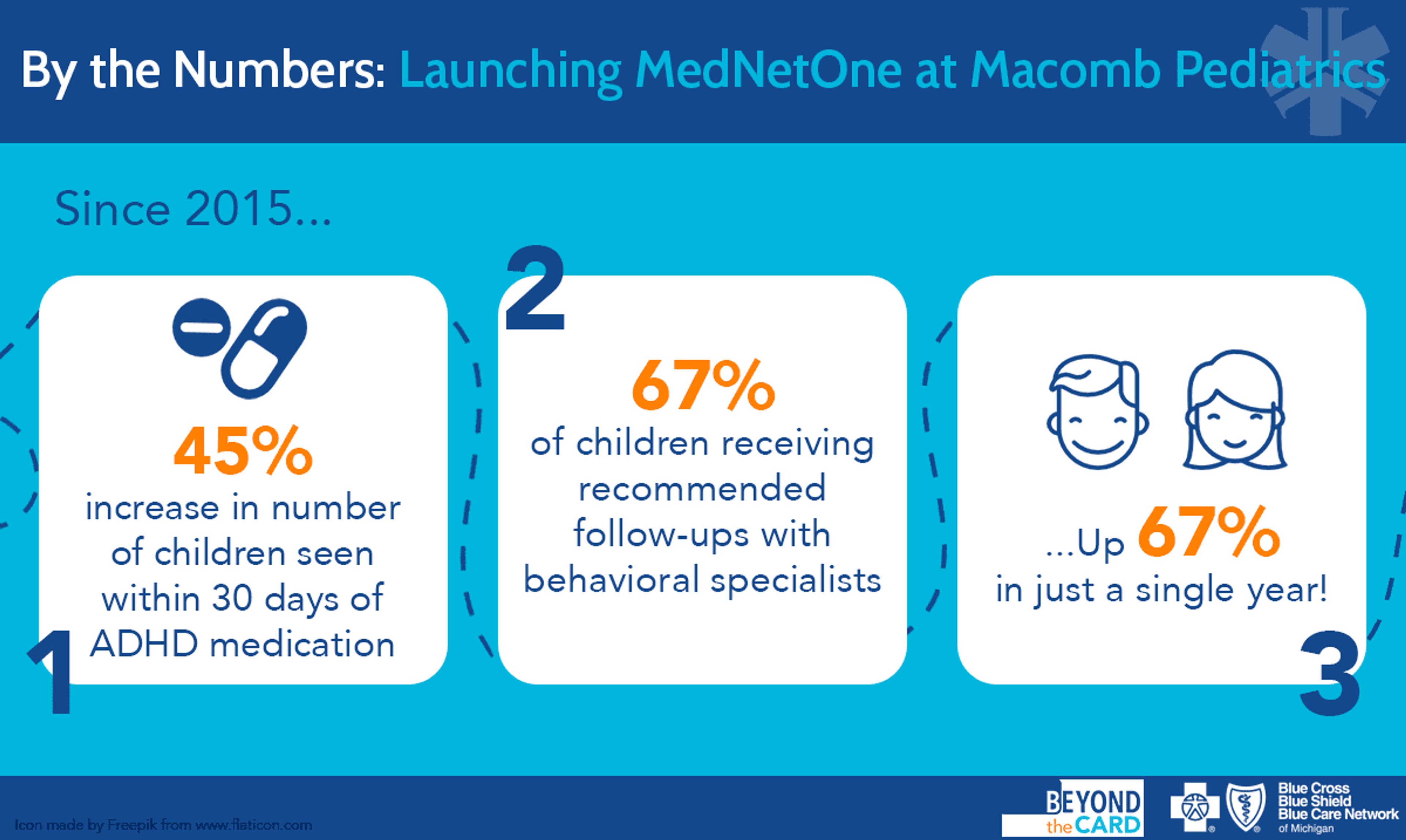Beyond the Card: Ensuring ADHD Patients Get the Help They Need
bcbsm
| 3 min read

<span data-mce-type="bookmark" style="display: inline-block; width: 0px; overflow: hidden; line-height: 0;" class="mce_SELRES_start"></span> One out of every 10 school-age children: That’s how many kids have been diagnosed with attention deficit hyperactive disorder, or ADHD, in this country. And that means there are a lot of parents who have had to figure out the best treatment plan for their child — and who have learned that the first step is often medication. But a Rochester-based physician organization, MedNetOne Health Solutions, is hoping to change that trend by introducing a more comprehensive approach to supporting children with ADHD. With the help of Blue Cross Blue Shield of Michigan’s Physician Group Incentive Program, or PGIP, MedNetOne is embedding behavioral health specialists, like therapists and psychologists, into local pediatric practices. The hope: to move away from the practice of prescription-only ADHD treatment. “A lot of kids with ADHD are getting substandard care,” said Lori Zeman, director of behavioral health integration at MedNetOne. “Many kids get put right on medication with inadequate follow-up from the prescriber and without getting recommended behavioral therapies. The PGIP initiative, called Integrating Behavioral Health into General Medical Care: Improving ADHD Care, is seeking to increase the number of kids getting proper follow-up and measurement from their primary care physicians.” While there’s no doubt that medication can help most kids with ADHD, anywhere between 60 to 80 percent of children who are prescribed medication to treat the condition don’t receive the recommended number of follow-up appointments or monitoring, according to the Healthcare Effectiveness Data and Information Set, or HEDIS. The added behavioral health component introduced through this program is helping to not only target symptoms more effectively, but monitor the side effects of medication, assess the appropriate dosage and encourage positive habits and routines at home and school. And it’s working. Since its launch in 2015, this integrated approach has shown tremendous benefits to patients and their families, empowering them with the knowledge and resources necessary to get the best treatment possible. For example, after embedding a behavioral health care manager, the number of children seen within 30 days of receiving medication jumped from 44 to 64 percent at Macomb Pediatrics. Similarly, 67 percent of children received the recommend follow-ups, compared to only 40 percent the previous year.

“Families appreciate only having to go to one place to get ADHD treatment for their children,” said Stephanie Laughlin, licensed master social worker and embedded behavioral specialist at MedNetOne. “They like the fact that I have regular contact with the pediatricians and that I can coordinate school records and communicate with school counselors. And the physician is also getting accurate information from the community about how the kids are responding to the ADHD medication.” The PGIP partnership with MedNetOne enables behavioral health specialists like Stephanie to spend enough time with patients and really understand what the best options are moving forward. And following the initial diagnosis, these behavioral health specialists can provide a more complete assessment, ruling out any other conditions that may be affecting the behaviors and symptoms of the child. “I’m able to spend more time with the family as far as giving them resources, helping them develop routines and schedules at home, coordinating with the school and sometimes meeting with the families to come up with strategies to ease the burdens of having this chronic condition,” Laughlin added. Through PGIP participation with organizations like MedNetOne, Blue Cross continues to improve the quality of care for kids across Michigan. “The program provides a really nice infrastructure where participating organizations can get together and share ideas and lessons learned with each other, creating a collaborative, supportive environment to make real improvements,” said Zeman. For more stories about improving health care for Michiganders, check out these blogs:





